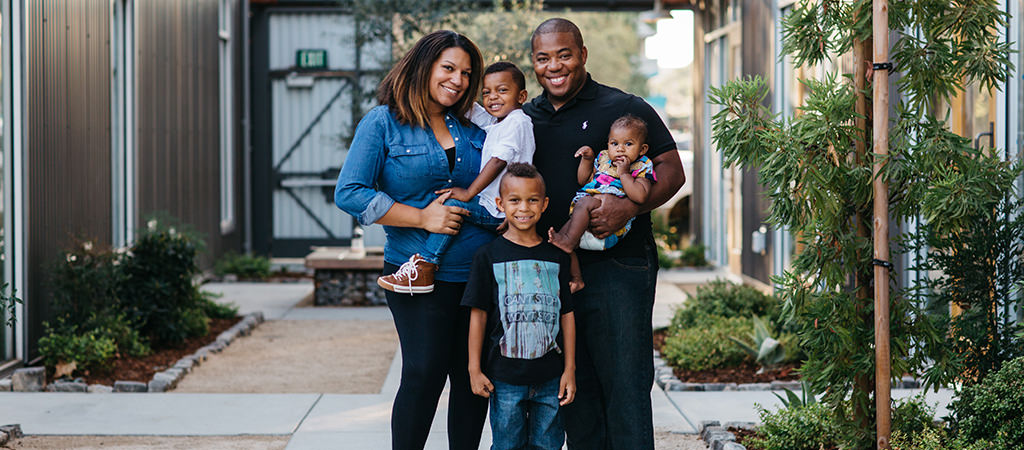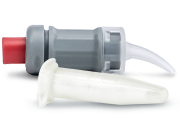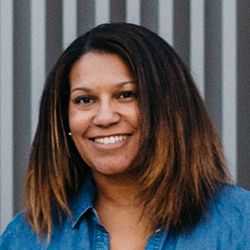
Jessica’s son Alex (pictured above hugging his mother) has EZCrowns on his second molars, teeth A, J, K, and T.
When you found out your son, Alex, needed crowns, what went through your mind, knowing what you know as an RDA?
JESSICA: As soon as Alex’s second primary molars started to erupt, I noticed they had hypoplasia (defective enamel formation.) I watched these four teeth closely as they erupted. When Alex was almost 3 years old, and as soon as the molars had erupted fully, I knew it was time to cap those teeth with crowns. Being a mom as well as an RDA and knowing what I do about the importance of prevention, I found it hard to face the reality that my own child needed dental treatment. Yet, in Alex’s case, since the hypoplasia on his teeth resulted from uncontrollable causes, there was no way for me to have prevented the condition. All I could do was to make sure his teeth would be treated correctly.
With your background assisting with general anesthesia on a monthly basis in the dental office, did that experience affect your decision on how and where Alex would be treated?
JESSICA: I have watched children go under sedation for over 15 years. I have also seen kids in the dental office undergoing treatment and experiencing unpleasant situations which could have been avoided if their parents had chosen to request sedation. My son Alex is young, and I did not want him to be “traumatized” if the visit did not go well. I have seen that happen far too many times. Previously, my older son Jordan had a small occlusal cavity on #L. I decided to treat him in the dental office, but the visit did not go well. Let’s just say it has taken him three years to finally be at ease during his routine visit to take X-rays and do a prophy. I did not want Alex to have that kind of experience.
As soon as I knew Alex would need treatment, I was 100 percent in favor of choosing sedation for him. If I was not experienced in the use of anesthesia, then I may have felt differently and not wanted my son sedated. I probably would have wanted to see how the treatment would go in the dental office without sedation. However, due to my previous experience as an RDA, I did not even consider having Alex’s dental treatment attempted while he was unsedated. I wanted his future cleaning visits to continue to go well without creating any fear on his part. He is a very wiggly little boy, and I know he would have had trouble holding still for treatment. As a dental professional, I know that when kids do not hold still, the dentist has a difficult time doing the dental work and achieving 100 percent ideal results. So, I put my full trust in the sedation process with the knowledge that my son would have no idea of what happened and would continue to experience easy routine cleanings in the future.


How did your experience with Alex in the hospital differ from your own experience being part of the anesthesia team offering sedation in an office setting? Why did you choose one location over the other?
JESSICA: I chose for my son to have sedation done at Kaiser Permanente Medical Center, and it went flawlessly. Seizures run in our family, and since he has experienced one seizure already, I felt safer with him being sedated in the hospital instead of receiving IV sedation in my office. I also have Kaiser Insurance, so my co-pay was not that much. My experience as a mom with Alex in the hospital was good. I knew the steps that the nurses, dentist, and anesthesiologist would take. I understood why they were checking his vitals. I knew what was going to happen once he was wheeled away from me on the gurney. Prior to this experience, when I was part of the anesthesia team, I did not empathize that much personally with the patient’s parents because I had not been through it myself. Now that I have had my own experience with my child being sedated for dental treatment, I can sympathize more fully with parents.
When you saw Alex in recovery after the procedure, how did that make you feel? What was going through your mind?
JESSICA: I was happy to see Alex once he was in recovery. I had full confidence in the staff at Kaiser and prayed for no complications. I know from an assistant’s viewpoint, it is best to just let the child wake up on his own, slowly. I have seen many parents start to rock their children trying to rush them awake. My husband and I just sat there quietly with Alex, and once he started to wake up on his own, then we were right there to assure him. He woke up with no tears. The nurse gave him a popsicle, and he left happy. He even wanted to go to the park later that day.
How has your personal experience with Alex going through his anesthesia changed the way you interact with other parents whose children are preparing for sedation?
JESSICA: After my positive experience with my own son’s sedation, I am even more in favor of using sedation than I was before. I would not want to put a child through the fearful experience of unsedated treatment when there is such an easier way. In my opinion, children should have as positive a dental experience as possible. Now when I talk to parents, I am able to share with them my own experience and am better informed to advise them regarding the benefits of treating children with sedation. I am a parent first and a dental professional second. Sedation/anesthesia can be scary for both patients and their parents. The media have not helped the situation. I always recommend that parents educate themselves in advance. I urge them to ask questions and not rely only on news stories, since the information they report may not always be accurate.


